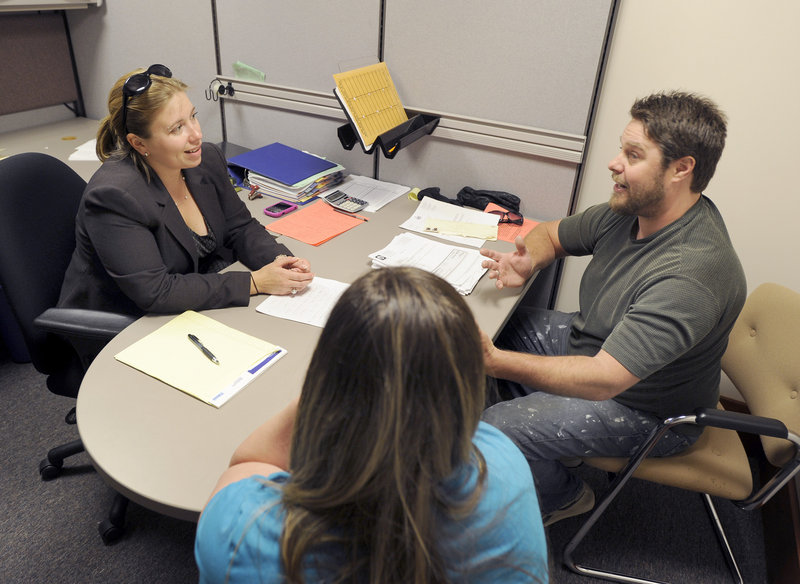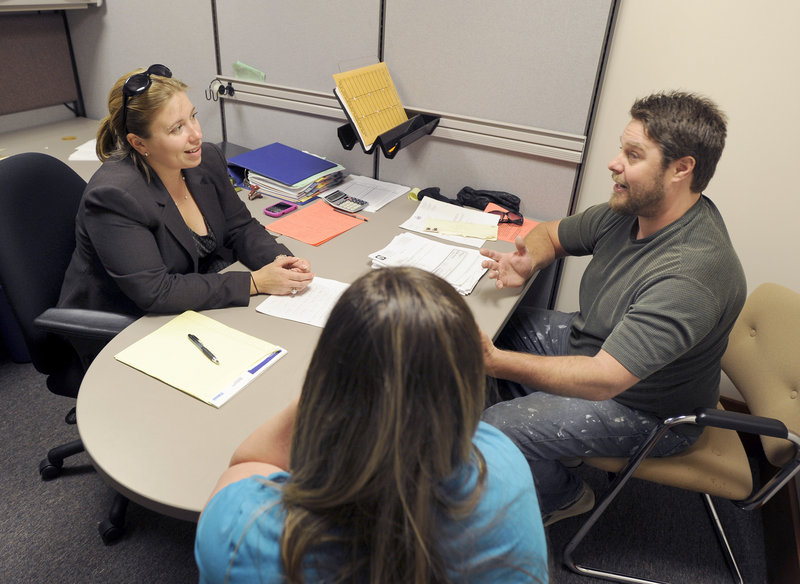PORTLAND – Jason Nest doesn’t have thousands of dollars, or even hundreds, to spend on a lawyer.
But the 37-year-old carpenter from Gray needs legal help.
After he and his girlfriend broke up, a judge gave the woman full custody of their child in 2004. Nest said he had no knowledge of his rights or how the court system worked, so he basically just accepted the ruling. Now, he wants to negotiate shared custody.
That’s what brought Nest to Portland District Court, where he spent about 45 minutes Thursday afternoon in a conference room with Alicia Cushing, a lawyer from the firm Givertz, Hambley, Scheffee & Lavoie.
“I feel so much better about going into a courtroom,” Nest said after speaking with Cushing. “She did a fantastic job.”
Best of all for him — and for the other people who waited Thursday to consult with Cushing or attorney Clifford Ruprecht — was that the legal assistance was free.
It’s called the Courthouse Assistance Project, and it was created in 2007 by Maine’s Volunteer Lawyers Project, a nonprofit legal aid organization.
From 1 to 4 p.m. every Thursday, lawyers donate their time to help low-income individuals with matters of family law, including divorces and custody disputes. The same program is offered at Lewiston District Court on the same day and time, and at Biddeford District Court from 1 to 4 p.m. on Fridays.
Last year, the project served about 830 people. Organizers say the number would be higher if more lawyers volunteered, because sometimes too many clients show up for the sessions.
Juliet Holmes-Smith, director of the Volunteer Lawyers Project, spent extra time this week speaking to people about the Courthouse Assistance Project because it exemplifies the spirit of Law Day, which is celebrated annually on May 1.
Created by President Dwight Eisenhower in 1958, Law Day is a tribute to the principle of government under law.
Holmes-Smith said the Courthouse Assistance Project demonstrates the responsibility of lawyers to give back to society. It also is a reminder that all Americans should have access to the civil justice system, regardless of their wealth and social status, she said.
The state pays for defense lawyers in criminal cases, in which defendants could go to jail. But that isn’t the case for civil matters such as divorces and disputes over child support payments.
“All of these people would otherwise have no legal advice from a lawyer. That really puts them at a disadvantage. They’re lost,” Holmes-Smith said Thursday at Portland District Court.
Cushing agreed. She began practicing law in 2007 after graduating from the University of Maine School of Law in Portland.
Her firm handles calls on a help line run by the Volunteer Lawyers Project, so Cushing got involved. Then she heard about the Courthouse Assistance Project. She has become one of its most active volunteers, donating more than 30 hours of work over the past year.
“Unfortunately, in a lot of cases, money equals justice,” Cushing said. “When it comes to family law, it is so difficult to navigate the system. For people to be able to come in and talk to people who can help them understand the basics, I think, is huge.
“Another great part of the project is that people can come back and get more help if they need it,” she said.
About 35 to 40 lawyers participate regularly, spread out over the three locations.
Ruprecht, the other lawyer who talked with clients in Portland on Thursday, is one of the top civil litigators in Maine.
A partner at Pierce Atwood in Portland, Ruprecht specializes in complex disputes between businesses. He recently played a key role in defending Hannaford Bros. in connection with the theft of electronic data from the supermarket giant.
“I became aware of the project pretty early on and I was very impressed that VLP did this,” he said of the Courthouse Assistance Project. “It is a really creative and effective approach to try to meet an overwhelming need.”
Ruprecht is the pro bono coordinator at Pierce Atwood. That means he helps other lawyers at the firm link up with pro bono opportunities, based on their skills, initiative and availability. Lawyers have a professional responsibility to give back to their communities, Ruprecht said.
“It is called the bar for a reason. In a courtroom, there is an actual bar that keeps people out,” he said. “As a lawyer, when you are allowed to step over the bar, that comes with a responsibility to give back.”
Ruprecht said the project benefits lawyers as well as the clients who receive help.
“There are fundamental lawyering skills that every lawyer has to have. People skills. Communication. Good judgment,” he said. “You sharpen those skills every time you use them. It doesn’t matter if your client is a multimillion-dollar corporation or a single individual.”
Staff Writer Trevor Maxwell can be contacted at 791-6451 or at:
tmaxwell@pressherald.com
Send questions/comments to the editors.




Comments are no longer available on this story